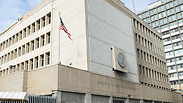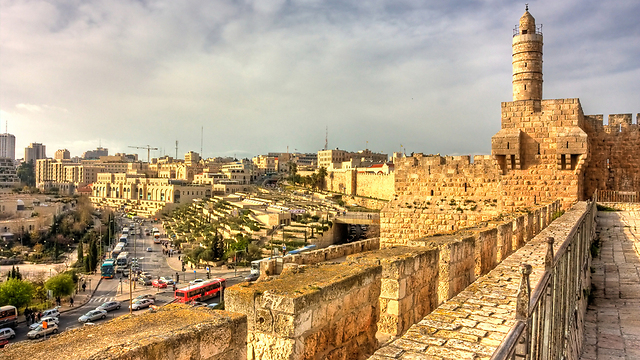
US Embassy building in Tel Aviv
צילום: AFP
How can Israelis oppose US embassy move to Jerusalem?
Op-ed: The fact that the Zionist Left feels uncomfortable with the American initiative to relocate the embassy to Israel’s capital is troubling, but so is everyone else’s indifference.
Jerusalem has not been Israel’s capital since the 1990s, at least not in the eyes of large parts of the people in this country. The first intifada scared the Israelis, the second one drove them away, and the latest one – a shorter one this past year – was received with relative indifference. This is the only reason why some Israelis, absurdly, find it logical to object to the American initiative to move the US embassy to Jerusalem.

Unlike others, I have no idea how the Arab world will react to the embassy move, but I do know that the citizens of a sovereign state cannot object to the opening of embassies in their capital. It doesn’t cross the level of reason, unless they don’t see Jerusalem as the capital but rather Tel Aviv.

Jerusalem is beautiful to its lovers and remarkably ugly to its haters – and, unfortunately, there are more and more of those (Photo: Shutterstock) (צילום: shutterstock)
In many election campaigns, including the latest one, the Right and Left have been quarreling over Jerusalem. There is always someone who is putting us in danger by dividing the city – Shimon Peres, Ehud Barak, Ehud Olmert, and in the latest election campaign Prime Minister Benjamin Netanyahu warned that Isaac Herzog and Tzipi Livni would bring us to the Western Wall in armored personnel carriers. In practice, it doesn’t matter which government is in power, the trend is the same trend, and it’s concerning. The internal dispute over the embassy move is just a reflection of this trend.
Forget about pragmatism and a cold analysis of the ramifications of the move on the Arab world and on the Palestinians. Our conflict with them does not depend on anything. Once it’s Netanyahu and the Western Wall Tunnels, then it’s Ariel Sharon and the Temple Mount visit, another time it’s riots in the Negev and the next time it’s just a conspiracy. The essence is whether we see Jerusalem as a capital and treat it accordingly. The answer, unfortunately, is no.
At the first days of the al-Aqsa Intifada, I took part in planning a tour to archaeological sites on behalf of one of the defense establishment bodies. They asked to skip Jerusalem for fear of suicide attacks. I found it somewhat irritating. If security officials avoid touring the capital during difficult times, what will the common citizens say? And even if we assume that there is an understandable fear during days of an intifada, on routine days there is not a single good explanation for why Israelis stay away from large parts of the city.
Here’s the painful truth: Jerusalem is beautiful to its lovers and remarkably ugly to its haters – and, unfortunately, there are more and more of those. The Jerusalem Day celebrations, which mark the city’s unification, turned long ago into an exclusive holiday for Religious Zionism – a population segment which I know and appreciate, but a small segment within a large society.
The demography in the city is becoming impossible with the seculars’ flight and the fact that an absolute majority of elementary school children study in non-Zionist streams. Government ministries, despite numerous promises, remain in Tel Aviv, and entire neighborhoods are not subject to governmental control. The western part of the city is well kept, and as for the eastern side of the city – it depends how much and when.
In every lecture in which I discuss Jerusalem, I discover fewer people who know what I’m talking about: What is Kafr Aqab, which became a Jerusalem neighborhood in an exterritorial area, where is the Church of All Nations located, where can one find the best hummus in the Old City and what can one see from Beit Orot.
Every possible survey reveals that most Israelis feel a significant connection to Jerusalem. The Mount of Olives cemetery, according to the polls, is a consensus at least as much as Arlington National Cemetery in Washington. The observation post from the August Victoria area is more beautiful, in my opinion, than the view from the Eifel Tower. The only difference is in our attitude towards ourselves.
It’s unnecessary to go back to the statements of Zionist Movement leaders like David Ben-Gurion, that Jerusalem is Israel’s soul. It’s enough to go to Wikipedia or sing the state’s anthem to ourselves. If we believe in that, how can we oppose the American embassy’s move to Jerusalem?
Granted, it’s just a symbolic act, it holds no great diplomatic outcome or an achievement in the international arena, but that’s what happens in sovereign states. Every state has a capital city, and ours is Jerusalem. I am troubled by the fact that the Zionist Left feels uncomfortable with the American initiative to move the embassy to Israel’s capital, but I am as troubled by everyone else’s indifference.










